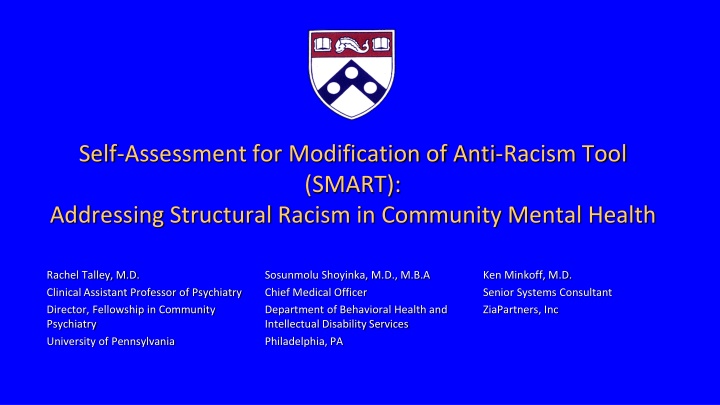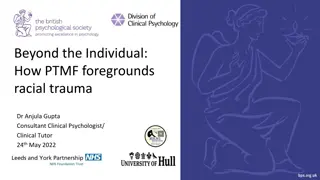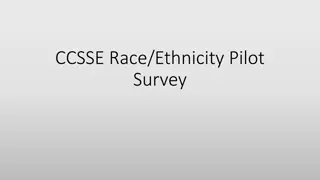Addressing Structural Racism in Community Mental Health: Self-Assessment Tool for Modification (SMART)
The Self-Assessment for Modification of Anti-Racism Tool (SMART) aims to address structural racism in community mental health through commitments to creating safe spaces, challenging biases, and advocating for equity. Next steps involve providing metrics specific to disparity and inequity issues, extending beyond cultural competency, and promoting quality improvement processes. Existing frameworks like Structural Competency and CLAS are considered in this initiative led by the Department of Psychiatry.
Download Presentation

Please find below an Image/Link to download the presentation.
The content on the website is provided AS IS for your information and personal use only. It may not be sold, licensed, or shared on other websites without obtaining consent from the author.If you encounter any issues during the download, it is possible that the publisher has removed the file from their server.
You are allowed to download the files provided on this website for personal or commercial use, subject to the condition that they are used lawfully. All files are the property of their respective owners.
The content on the website is provided AS IS for your information and personal use only. It may not be sold, licensed, or shared on other websites without obtaining consent from the author.
E N D
Presentation Transcript
Self-Assessment for Modification of Anti-Racism Tool (SMART): Addressing Structural Racism in Community Mental Health Rachel Talley, M.D. Clinical Assistant Professor of Psychiatry Director, Fellowship in Community Psychiatry University of Pennsylvania Sosunmolu Shoyinka, M.D., M.B.A Chief Medical Officer Department of Behavioral Health and Intellectual Disability Services Philadelphia, PA Ken Minkoff, M.D. Senior Systems Consultant ZiaPartners, Inc
Disclosures/Acknowledgements No conflicts to disclose Acknowledgement: Ken Minkoff, MD Department of Psychiatry
AACP Statement on Police Brutality and Structural Racism We commit to creating safe spaces for patients and colleagues to give voice to their experiences of racial trauma and to approaching patient care through the lens of structural competency. We commit to challenging our own implicit biases and confront discriminatory speech and acts in our colleagues and friends. We commit to identifying structural inequity in hiring, disciplinary and promotion practices within our own institutions, to speaking out against them, and to improving equity in these areas. We commit to educating ourselves on laws and policies both local and national that sustain racist practices in our society, and to engaging with our local and national officials to dismantle these systems of oppression. Department of Psychiatry
Next Steps: AACPs Goal 1 2 3 Provide metrics specific to disparity and inequity issues in community mental health Extend beyond culture competency and linguistic appropriateness to incorporate structural inequity Promote a stepwise, concrete quality improvement process than could be adapted for self-directed use in community mental health settings Department of Psychiatry
AACPs Process Membership Town Hall Advocacy + Products Subcommittee Discussion Identification of target inequity issues Relevance to community mental health Evidence-based Consideration of prior framework literature Department of Psychiatry
Existing Frameworks Structural Competency The National Standards for Culturally and Linguistically Appropriate Services in Health and Health Care (CLAS) Roadmap to Reduce Disparities Research to Equip Primary Care for Equity (EQUIP) Department of Psychiatry
Quality Improvement and Anti-Racism in Community Behavioral Health Organizations SERENITY PRAYER OF SYSTEM CHANGE: The serenity to accept what you cannot change, which is everyone else. The courage to change what you can: your own program. FOCUS PDCA: FIND a process to change (structural racism). ORGANIZE a team (to use the tool). CLARIFY the baseline (with the tool). UNDERSTAND the variance (why is your baseline the way it is) SELECT issues to address Use PLAN-DO-CHECK-ACT (PDCA) change cycles. Department of Psychiatry
SMART: Rationale for a structured tool Replace subjective impression with actionable information Look at organizational processes rather than individuals Generate data for the quality improvement process. Identify areas where more data are needed Create a framework for diverse staff group discussions Provide training by doing for staff using the tool. Use scoring to facilitate group consensus and prioritization Department of Psychiatry
SMART Domains Hiring, Recruitment, Retention and Promotion Clinical Care Workplace Culture Community Advocacy Population Health Outcomes/Evaluation Department of Psychiatry
SMART Recommended Process Group conversation for self-assessment Diverse group of staff from all levels of organization Catalyst for broader conversation on inequity Consensus scoring Generate an action plan for improvement Reassess in 6-12 months Department of Psychiatry
Domain 1: Hiring, Recruitment, Retention and Promotion Promotion Mentorship and Career Development Recruitment Hiring Retention Disciplinary Action Department of Psychiatry
Domain 1: Sample Item Department of Psychiatry
Domain 2: Clinical Care Clozapine Access Client Engagement Social Determinants Involuntary Treatment Diagnostic Disparities Access to Care Treatment Disparities Client Satisfaction Department of Psychiatry
Domain 2: Sample Item Department of Psychiatry
Domain 3: Workplace Culture Intentional anti-racism Facilitating staff-to-staff conversations Facilitating staff-to-client conversations Implicit bias training Trauma-informed culture Formal Reporting Structural training Department of Psychiatry
Domain 3: Sample Item Department of Psychiatry
Domain 4: Community Advocacy Law enforcement/criminal justice School-to-prison pipeline Child protective services Housing insecurity Elder care Department of Psychiatry
Domain 4: Sample Item Department of Psychiatry
Domain 5: Outcomes/Program Evaluation Health Outcomes Functional Outcomes Department of Psychiatry
Domain 5: Sample Item Department of Psychiatry
Future Directions Department of Psychiatry
Future Directions Now available at AACP website please consider piloting! https://www.communitypsychiatry.org/resources/smart-tool Structured feedback tool Piloting/Early Adopters Department of Psychiatry
Questions/Comments? Department of Psychiatry
References American Association for Community Psychiatry (2020, June 3). AACP Statement on Police Brutality and Structural Racism. https://drive.google.com/file/d/1l4FM14xy6AXn6CknSjuo1LUrqIDB5zrW/view Browne, A.J., Varcoe, C., Ford-Gilboe, M., Wathen, C.N. on behalf of the EQUIP Research Team (2015). EQUIP Healthcare: An overview of a multi-component intervention to enhance equity-oriented care in primary health care settings. International Journal for Health Equity, 14: 152 Metzl J.M. & Hansen, H. (2014). Structural competency: theorizing a new medical engagement with stigma and inequality. Social Science & Medicine, 103, 126-33. Office of Minority Health, U.S. Department of Health and Human Services. (2013, April). National Standards for Culturally and Linguistically Appropriate Services in Health and Health Care: A Blueprint for Advancing and Sustaining CLAS Policy and Practice. Available at https://thinkculturalhealth.hhs.gov/assets/pdfs/EnhancedCLASStandardsBlueprint.pdf. Advancing Health Equity (n.d.). Robert Wood Johnson Foundation. https://www.solvingdisparities.org/about Department of Psychiatry























